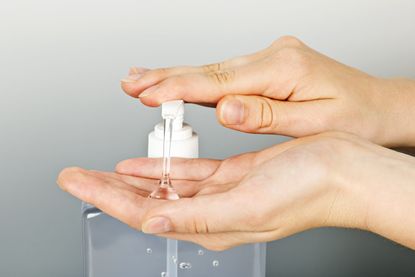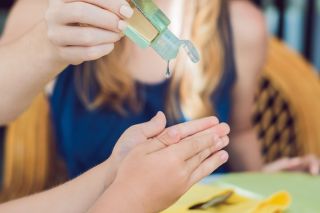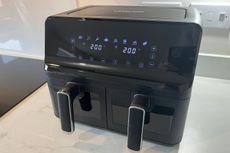You need to make sure your hand sanitizer has this in order to protect against coronavirus
Is it actually helpful?

As the coronavirus continues to escalate, conversation has focused on how we can try and protect ourselves against the disease.
And for many members of the public, that protection appears to have come in the form of hand sanitizer.
Across the UK, reports are flooding in that shops including Boots, supermarkets, and pharmacies are running out of the product, with people stockpiling the stuff in the wake of the coronavirus outbreak.
Both Boots and LloydsPharmacy have revealed that they are now limiting sales of hand sanitizer to two bottles per person, in order to cope with demand.
The coronavirus outbreak has so far seen over 90,000 confirmed cases, with 87 of them in the UK.
So of course it's only natural to want to protect yourself against the virus. But is hand sanitizer really the best way to do that?
Does hand sanitizer protect against the coronavirus?
Sales of hand sanitizer may be soaring, but does it actually help to prevent the spread of the virus and the chance of getting it yourself?
GoodtoKnow Newsletter
Parenting advice, hot topics, best buys and family finance tips delivered straight to your inbox.
According to most experts, it's actually not the best option.
Dr Jonas Nilsen, MD and cofounder of travel vaccination specialist Practio, explained that soap and water is always preferable to sanitizer. He told GoodtoKnow, "Washing your hands with soap and water is the best way to remove bacterias and viruses. However, if soap and water are not available, you can use an alcohol-based hand sanitizer."
But, if you do need to use hand sanitizer, Dr Jonas warned that it needs to have one certain thing, in order to be effective against coronvairus.
"It’s important that the sanitizer contains at least 60% alcohol", he said. "But, you should know that sanitizers do not remove all types of bacteria and viruses, and they are not very effective if your hands are visibly dirty or greasy."
So it seems the general consensus is that it's great to have hand sanitizer if you have no access to soap and water - but be aware that it has its limitations in preventing the spread.
Which hand sanitisers work best?
Given that hand sanitizers need to have at least 60% alcohol to be effective, some brands may be more useful than others.
- Purell Advanced Hand Sanitizer Refreshing Gel has 70% alcohol, so well above the recommended amount, meaning it's a great option - if you can manage to get your hands on it!
- Carex's Original Hand Gel also has 70% alcohol content
- And Superdrug's own brand hand sanitizer has just enough, at 62%.

If you are able to pick up some sanitizer, it's worth checking the alcohol content (or ethanol, as it may be called) before purchasing, to ensure it will be as effective as possible.
When should we be using hand sanitiser - and how much should we be using?
The Centers for Disease Control and Prevention advises applying the product to the palm of one hand, and then rubbing all over the surfaces of your hands until they are dry.
And the general consensus is that you don't need to use much at all - a small blob should be fine.
It makes sense to use sanitizer whenever you have been in contact with potentially infected people or surfaces, and, again, if you are not able to wash your hands with soap and water. Dr Jonas suggests using it:
- after blowing your nose, sneezing or coughing
- after traveling on public transport
- after going shopping, for example in supermarkets or shopping centre
- after visiting public areas, such as libraries, museums and parks
Should children be taking hand sanitizer to school?
Young children can also use hand sanitizer to protect against the virus, but it's important to be more cautious with them using the product given its high alcohol content - make sure they're aware that they shouldn't put it anywhere near their eyes, mouth, or nose.
MORE: Everything you need to know about coronavirus - including whether you can still travel abroad
Dr Jonas advises, "If your children are old enough to learn how to use hand sanitizer, I would teach them and give them one to take to school.
"If your children are still small, you should encourage them to wash their hands often instead, and practise sneeze and cough etiquette with them. It could be a good idea to speak with the school about it and put an agreement in place, so everyone is on the same page."
Should we be stockpiling hand sanitizer - and other products like food and toilet roll?
It's understandable to feel panicked during national health crises, and seeing photographs of empty shelves will leave any questioning whether they need to stock up on supplies.
On Tuesday, the government chief medical adviser Sir Patrick Vallance said we needn't be stockpiling though.
He said, “I think the advice is that there is absolutely no reason to be doing any panic buying of any sort or going out and keeping large supplies of things,” before reassuring that suppliers are prepared for increased demand.
Amy is Senior Digital Writer across Woman & Home, GoodTo and Woman, writing about everything from celebrity news to health, fashion and beauty features. When she isn't obsessing over the latest dress drop from Marks & Spencer, you'll most likely find Amy out running, or with a cup of tea in hand ready to dive into a gripping new Netflix series.
-
 I tested the Lakeland Dual Basket air fryer and it made midweek family cooking a breeze
I tested the Lakeland Dual Basket air fryer and it made midweek family cooking a breezeYou can’t go wrong with the dual basket air fryer by Lakeland complete with easy-view windows to ensure burnt food is a thing of the past…
By Jessica Dady Published
-
 Reframing one simple habit could get your sex life back on track after having a baby, new research shows
Reframing one simple habit could get your sex life back on track after having a baby, new research showsMany parents struggle to get their sex life back on track after having a baby, but new research has shown how one simple habit could make all the difference.
By Ellie Hutchings Published